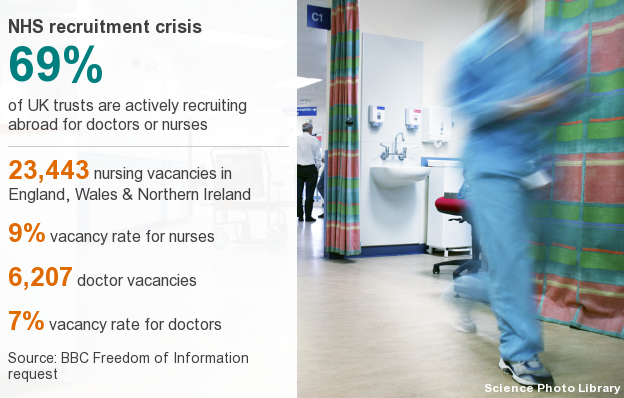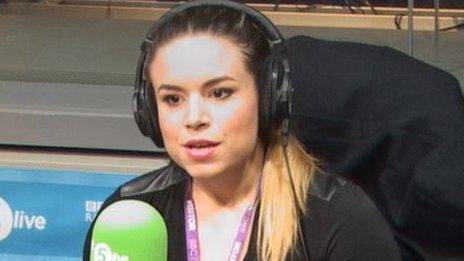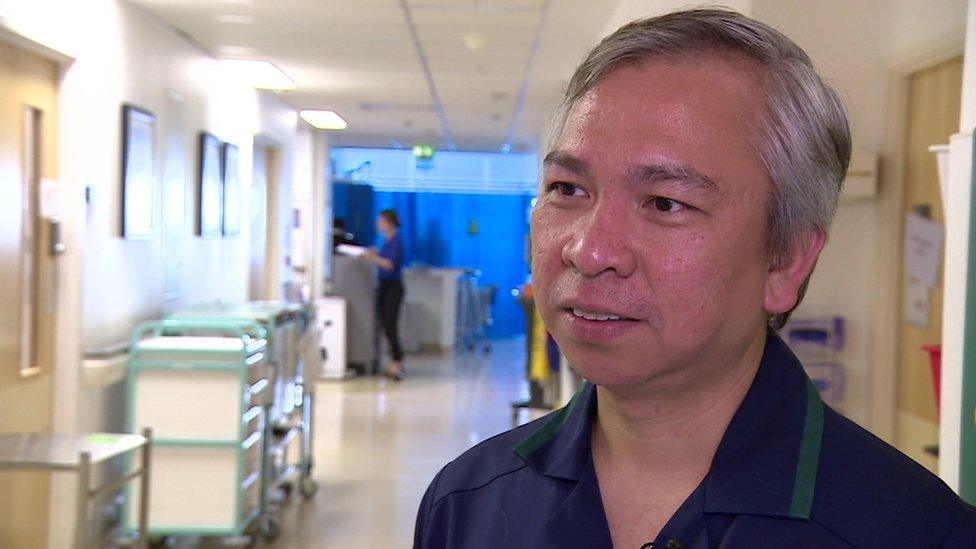Thousands of NHS nursing and doctor posts lie vacant
- Published

More than two-thirds of trusts and health boards in the UK are actively trying to recruit from abroad as they struggle to cope with a shortage of qualified staff, figures reveal.
Tens of thousands of NHS nursing and doctor posts are vacant.
The statistics, obtained by the BBC, show the scale of the NHS recruitment crisis.
Health unions blame poor workforce planning, but officials say the NHS has more staff than ever before.
Data from a BBC Freedom of Information request shows that on 1 December 2015, the NHS in England, Wales and Northern Ireland had more than 23,443 nursing vacancies - equivalent to 9% of the workforce.
Agency workers
Rose Lagrosas from Manila explains why she wants to work in the UK
In comparison, the average vacancy rate across the UK economy from November to January 2016 was 2.7%, according to the Office for National Statistics, external.
The figures - which include 106 out of 166 trusts and health boards in England, Wales and Northern Ireland - also revealed:
Between 2013 and 2015, there has been a 50% increase in nursing vacancies, from 12,513 to 18,714.
For doctors, the number of vacancies went from 2,907 to 4,669 - an increase of roughly 60%.
In England and Wales, there were 1,265 vacancies for registered nurses in emergency departments - about 11% of the total.
For consultants in emergency medicine there were 243 vacancies - again 11% of the total.
Paediatric consultants - specialists in the care of babies, children and young people - were also hard to recruit, with 221 vacancies - about 7% of the total.

Analysis: Dominic Hughes, health correspondent
There are many reasons for the large number of vacancies in nursing and doctor posts on hospitals in England, Wales and Northern Ireland. One simple reason is that more posts now exist, but the number of trainees has not kept up. In the wake of the 2008 financial crash, nursing places were cut, although they are now on the way back up. The BMA suggests it takes around 15 years between a medical student starting out at university and becoming a consultant so planning the NHS workforce supply and demand is a complicated process with a long lead-in time.
But there are also increasing pressures on the health service right across the UK which the NHS is having to respond to - a growing population that is older and sicker, with more complex health needs. In plain language "complex health needs" means more than one thing going on at a time, so an elderly person might be having to cope with arthritis, diabetes and heart problems. But one other important factor is the "Francis effect" - the report by Sir Robert Francis into the scandal at Stafford Hospital identified a shortage of nurses as a key factor in the poor care of patients. Trusts in England in particular have been under pressure to recruit more staff. But when there is a shortage of qualified nurses they have resorted to expensive agency staff and that in turn has led to a growing financial crisis.

Vacancy rates in Scotland are published quarterly and so comparable figures are not yet available.
In England, many hospitals are having to rely on expensive agency workers to make up the shortfall in staff.
That has been identified as a key factor driving a growing financial crisis within the health service.
NHS recruitment crisis
69%
of UK trusts are actively recruiting abroad for doctors or nurses
-
23,443 nursing vacancies in England, Wales & Northern Ireland
-
9% vacancy rate for nurses
-
6,207 doctor vacancies
-
7% vacancy rate for doctors

One solution to the staff shortage adopted by many trusts is employing doctors and nurses from overseas.
The BBC also asked trusts and health boards across the UK whether they were actively recruiting staff from abroad, and in this case Scottish hospitals were also able to answer.
The figures show more than two-thirds - 69% - of all NHS trusts and health boards are seeking staff overseas.
And in just England and Wales, the figure is nearly three-quarters of all trusts and health boards - 74%.
Some are travelling from as far afield as India and the Philippines.

'No opportunities back home'

Maca Fernandez Carro said she liked working for the NHS
Maca Fernandez Carro is a nurse who is originally from Bilbao in Spain, but has worked at Royal Bolton Hospital since 2014.
She told BBC Radio 5 live: "There was no opportunities for us back home. The options were having a three-month contract [in Spain], or coming here with a permanent position.
"Nursing is so different back home. When we qualify [in Spain] we are expected to do all the techniques that over here you'd need extra training [for].
"So we do a four-year degree, instead of a three-year one, so we have an extra year in which we train the technical part of nursing.
"Even though we are really under pressure, and really, really stressed - I like working for the NHS."

Matthew Hopkins, who is the chief executive of Barking, Havering and Redbridge University Hospitals NHS Trust, told BBC Radio 4's Today programme that employing more agency workers compromised patient safety and care.
"The difficulty with running a relatively high vacancy rate is it does inhibit the ability to provide the best care for our patients," he said.
"We have to supplement our staff with agency workers who are not part of the team on a regular basis and therefore the quality of teamwork, which we know has the biggest impact on patient care and patient safety, is compromised."
Ian Cummings, the chief executive Health Education England, told the same programme the nursing shortage in the NHS had been partly caused by "quality failings" - such as the Mid Staffs scandal.
Dominic Hughes explains how the recruitment process works
"The quality failings in the NHS have caused our regulators and hospitals to look very carefully at how many nurses they need to deliver safe and high quality care.
"So the hospitals, for roughly the same number of beds compared to three years ago, now have a need for 24,000 more qualified nurses," he said.
Meanwhile, the Royal College of Nursing and the British Medical Association blame poor workforce planning for the problems hospitals are having in finding qualified staff.
Janet Davies, chief executive of the Royal College of Nursing, said: "Nursing posts are often the first target when savings need to be made, leading the NHS to find itself dangerously short and having to spend more on agency staff and recruitment from other countries."

Doctors and nurses are in demand in the NHS
A spokesman for the doctor's union the BMA - which is currently locked in a dispute with the government in England over a new contract for junior doctors - said: "Poor workforce planning means we aren't producing enough doctors and sending them to the right areas," he said.
However, in a statement, the Department of Health in England said: "Staffing is a priority — that's why there are already over 29,600 extra clinical staff, including more than 10,600 additional doctors and more than 10,600 additional nurses on our wards since May 2010."
But the statement also acknowledged that "much more needs to be done", and said the government was "changing student nursing, midwifery and allied health professionals funding to create up to 10,000 more training places by the end of this Parliament."
A Welsh Government spokesperson said: "There are now more doctors, nurses, midwives, paramedics and dental staff working in the Welsh NHS today than there were 10 years ago.
"We will continue to do all we can to support recruitment initiatives proposed by health boards and trusts and to address recruitment and retention at a national level."
Viewers in England can see more on this story on Inside Out on BBC One at 19:30 GMT.
- Published10 September 2015

- Published11 March 2014

- Published14 January 2016
